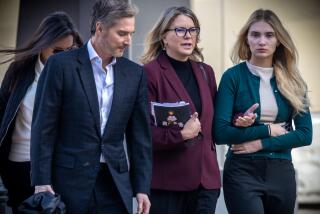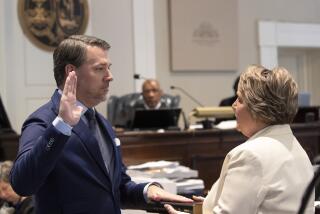2nd Bailiff Won’t Testify at Hearing : Hedgecock’s Lawyer Wants to Grant Woman Immunity to Get All the Facts
- Share via
One of the bailiffs who helped supervise San Diego Mayor Roger Hedgecock’s sequestered jury will refuse to testify at a court hearing on the jury-tampering charges that could reverse Hedgecock’s felony conviction, according to a defense motion filed Monday in Superior Court.
In a motion requesting that bailiff Holly Murlin be granted immunity, Hedgecock’s attorney, Michael Pancer, states that Murlin’s attorney has told him that Murlin “would assert her right under the Fifth Amendment” if called to testify at a hearing next month on whether another bailiff tampered with Hedgecock’s jury during its deliberations.
Pancer emphasized that the defense does not believe that Murlin “did anything improper” while assisting bailiff Al Burroughs Jr. during the jury’s 6 1/2 days of deliberations at a Mission Valley hotel. Suggesting that Murlin may be “understandably cautious and somewhat reluctant” to discuss the controversial topic, Pancer argued that granting Murlin immunity would be “the best way for her to tell what she knows” at a Nov. 4 hearing on the defense’s request for a new trial for Hedgecock.
“We’re not questioning any of Murlin’s activities,” Pancer said. “She’s only a witness to things that happened. All we’re interested in is what she observed. There’s absolutely no reason not to give her immunity.”
According to Pancer’s notion, Murlin’s attorney, Daniel Krinsky, also has specified that Murlin “would not be available for interview by either defense or prosecution investigators.” Krinsky could not be reached for comment Monday.
The defense views Murlin’s purported refusal to testify as, in the words of one source close to Hedgecock, “a very strong sign” that the jury-tampering allegations “may be on target.”
“If nothing happened . . . why would she be talking about taking the Fifth?” the source asked.
The Fifth Amendment to the U.S. Constitution permits a person to refuse to testify if he believes the testimony might incriminate himself.
In sworn statements filed last week, juror Kathy Saxton-Calderwood and John Learnard, the attorney for juror Stanley J. Bohensky, charged that bailiff Burroughs, in violation of court rules, talked on numerous occasions with jurors about the case and the progress of their deliberations. The sworn documents include allegations that Burroughs helped the jurors to define the crucial legal term of “reasonable doubt,” asked one juror for the names of others who were “holding up” deliberations, and persistently pressed the jurors to reach a verdict rather than deadlocking as the jury in Hedgecock’s first trial did.
Burroughs’ attorney, Anthony Beccarelli, has contended that the allegations against his client stem from “things taken completely out of context.” In an interview Monday, Beccarelli added that he and Burroughs “have not yet discussed or determined” whether the bailiff also would demand immunity.
“But I can tell you we’re going to be abundantly cautious, as all defense attorneys have to be, if that tells you anything,” Beccarelli said. In their motion for a new trial last week, Pancer and Hedgecock’s other attorney, Oscar Goodman, proposed that Burroughs also receive immunity so that, in Goodman’s words, “the truth will out.”
Goodman argues that the alleged “mere contact” between Burroughs and the jury, if confirmed in court, would be sufficient grounds for a judge to overturn Hedgecock’s conviction and order a new trial for the mayor--regardless of whether such “improper communications” affected jurors’ decisions.
However, Deputy Dist. Atty. Paul Morley, who is drafting the district attorney’s response to the defense’s motion for a new trial, contended Monday that “there’s a lot more to it than just what was said or done.”
“Various factors have to be considered to determine whether instances of alleged misconduct (by the bailiff) had, in fact, a prejudicial effect on the jury,” Morley said. “Misconduct may not necessarily result in prejudice . . . or the need for a new trial.”
Explaining that he believes that it is likely that “there will be some disagreements on exactly what the facts are” at the hearing, Morley added that “it’s going to be up to the court to resolve those disputes and decide whether they affected” Hedgecock’s conviction on one conspiracy count and 12 perjury counts, most stemming from alleged illegal 1983 campaign contributions.
The defense has requested that Judge William L. Todd Jr., who presided over both Hedgecock trials, not hear the request for a new trial. Pancer added that the defense expects to request that a separate hearing on whether Todd will remain on the case be held before Nov. 4.
Both Learnard’s and Saxton-Calderwood’s sworn statements--which include allegations that Hedgecock’s attorneys contend have been corroborated by at least two other jurors--touch on the question of how Burroughs’ alleged actions may have affected their or other jurors’ decisions. Both Morley and Goodman agree, however, that evidence on that particular point would not be admissible in next month’s hearing.
Under the state’s evidence code, hearings into “the validity of a verdict” may include evidence about “statements made, or conduct, conditions or events occurring, either within or without the jury room, of such character as is likely to have influenced the verdict improperly.”
The evidence code adds: “No evidence is admissible to show the effect of such statement, conduct, condition or event upon a juror either in influencing him to assent or dissent from the verdict or concerning the mental processes by which it was determined.”
To Morley, that provision means that “most of what (the defense has) offered so far is inadmissible and clearly falls short” of the proof needed to justify a reversal of Hedgecock’s conviction.
Goodman, however, argued that the evidence code “makes our job easier.”
“As a matter of law, all we have to show is that these improper events occurred. If we do that, there has to be a new trial,” Goodman said.
More to Read
Sign up for Essential California
The most important California stories and recommendations in your inbox every morning.
You may occasionally receive promotional content from the Los Angeles Times.












